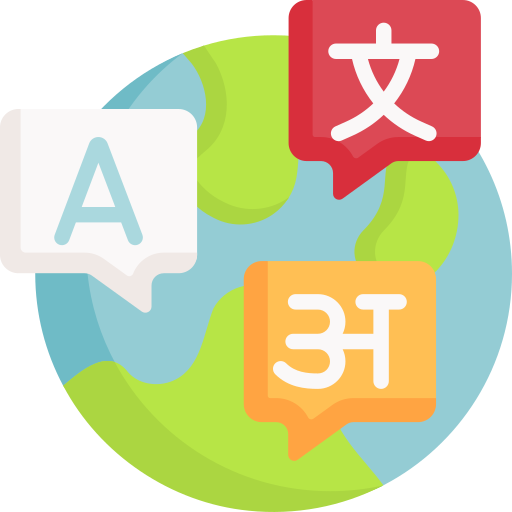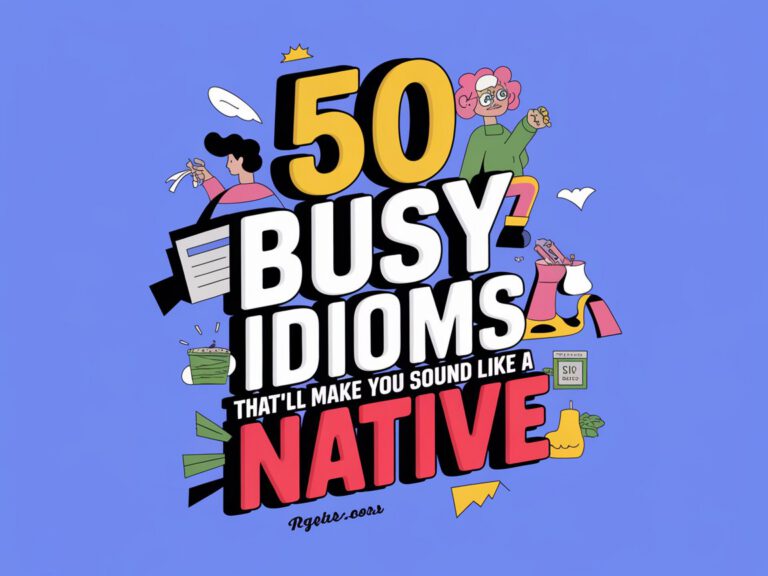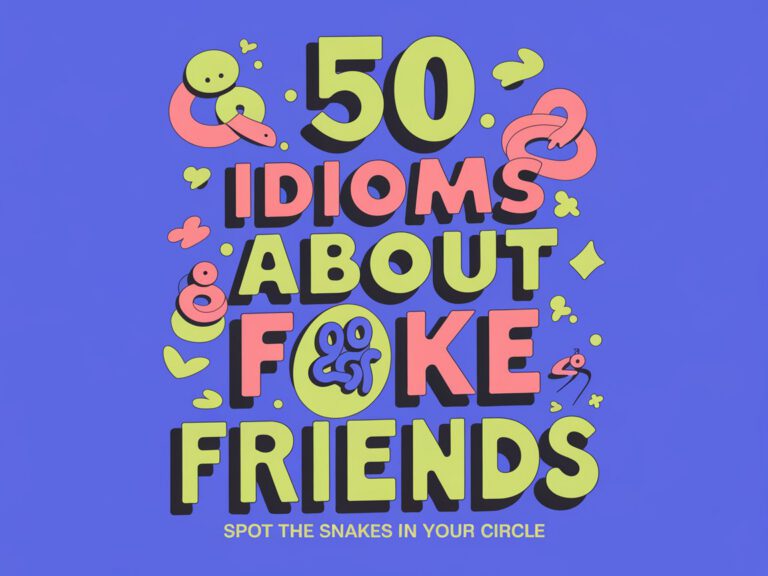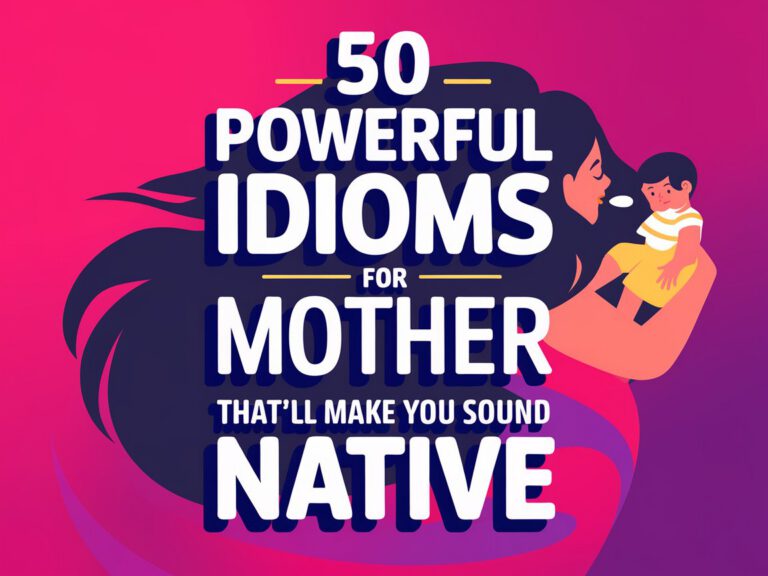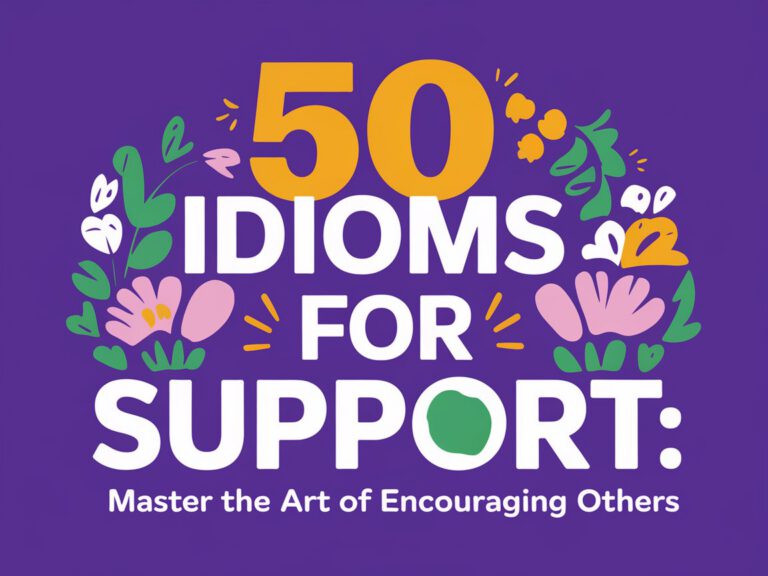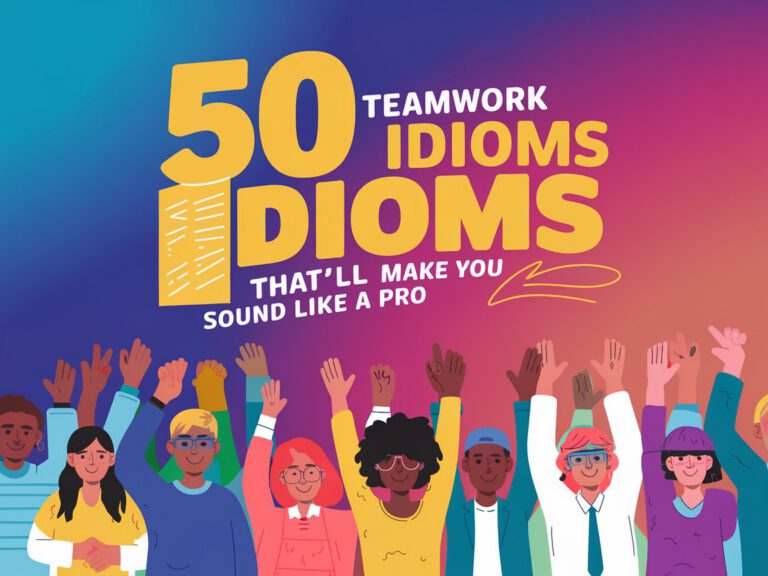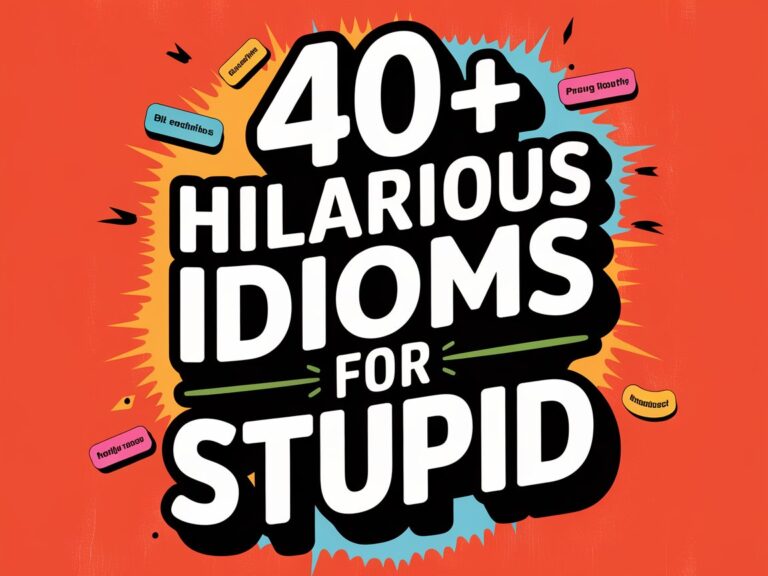50 Happy Idioms That’ll Make You Grin From Ear to Ear
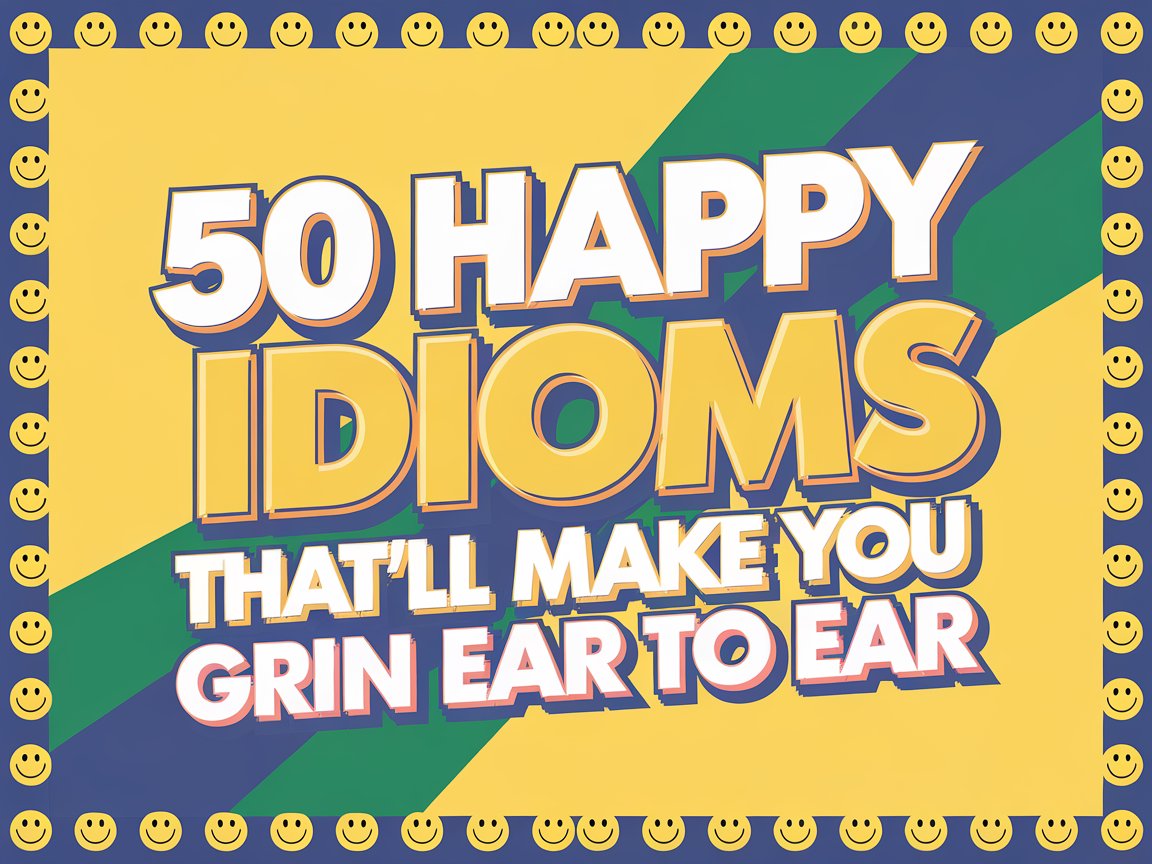
Learning idioms for happy feelings can transform your English from basic to brilliant. These colorful expressions help you sound more natural and connect better with native speakers. Instead of just saying “I’m happy,” you’ll discover dozens of creative ways to express joy, delight, and pure bliss.
Research Shows Why Happy Idioms Pack More Punch
Recent neuroscientific research reveals something fascinating about idiomatic expressions. According to a study published in the journal Neuropsychologia, idioms trigger stronger emotional responses than literal language. The research found that idioms activate both the brain’s language centers and emotional processing regions, particularly the amygdala, which handles emotions.
| Brain Region | Response to Idioms | Response to Literal Language |
|---|---|---|
| Left Inferior Frontal Gyrus | High activation | Moderate activation |
| Amygdala | Enhanced emotional engagement | Standard emotional response |
| Executive Control Functions | Stronger recruitment | Normal recruitment |
Another comprehensive study examined idiom familiarity across different age groups. Researchers found that idiom knowledge increases steadily with age, with the steepest learning curve occurring between ages 20-30. This means the more idioms you learn now, the more naturally you’ll use them later.
Pro Tip: Start with 5-10 idioms and use them in real conversations. Your brain will form stronger neural pathways when you practice these expressions in context rather than just memorizing them.
🧠 Test Your Happy Idiom Knowledge!
Question 1: What does “on cloud nine” mean?
Question 2: Which idiom means “perfectly content”?
Question 3: “Happy as Larry” originated from which country?
1. On Cloud Nine
When you’re on cloud nine, you’re not just happy—you’re absolutely ecstatic. This idiom means you’re experiencing extreme joy or bliss.
The phrase likely comes from the 1950s Weather Bureau cloud classification system. Cloud nine referred to the tall, fluffy cumulonimbus clouds that reach the highest altitudes. Being “on cloud nine” suggests you’re floating at the top of the world.
“Sarah’s been on cloud nine ever since she got accepted to her dream college.”
2. Over the Moon
Over the moon describes feeling incredibly delighted about something. This expression has its roots in the old nursery rhyme “Hey Diddle Diddle,” where the cow jumps over the moon.
While some consider it a bit old-fashioned, it’s still widely understood and used. The imagery of being so happy you could leap over the moon perfectly captures that feeling of boundless joy.
“Tom was over the moon when his startup got funded.”
3. Happy as a Clam
This quirky idiom means being very content and satisfied. The full original phrase was “happy as a clam at high tide”. Clams are safer from being harvested when the tide is high, hence their “happiness.”
It’s a perfect example of how idioms can paint vivid pictures with just a few words. The image of a content clam sitting safely underwater captures that feeling of peaceful satisfaction.
“Give me a good book and a cup of coffee, and I’m happy as a clam.”
4. Tickled Pink
When something tickles you pink, you’re delighted and amused. This idiom suggests being so pleased that you’re blushing pink from joy or laughter.
The expression dates back to the early 20th century and captures that warm, fuzzy feeling when something makes you genuinely happy. It’s often used for pleasant surprises or compliments.
“Grandma was tickled pink when all the grandkids showed up for her birthday.”
5. In Seventh Heaven
In seventh heaven means experiencing perfect bliss or ultimate happiness. This idiom comes from ancient Islamic and Jewish beliefs about seven levels of heaven, with the seventh being closest to God.
The religious origins give this expression a sense of divine joy—the kind of happiness that feels almost spiritual. It’s perfect for describing life’s most magical moments.
“The newlyweds were in seventh heaven during their honeymoon in Paris.”
6. Happy as Larry
Happy as Larry describes someone who’s extremely cheerful and content. But who was Larry? Most linguists believe it refers to Larry Foley, an Australian boxer who was famously described as “happy” after winning a big fight and earning a large sum of money.
This idiom shows how real people can become part of our language. Larry’s joy was so memorable that his name became synonymous with happiness itself.
“After getting that promotion, Jake’s been happy as Larry all week.”
7. Walking on Sunshine
When you’re walking on sunshine, you feel light, joyful, and carefree. This modern idiom creates a beautiful image of someone so happy they’re practically floating on rays of sunlight.
The expression gained popularity through the 1980s song “Walking on Sunshine” by Katrina and the Waves, but the sentiment is timeless. It captures that bouncy, energetic happiness that makes everything seem brighter.
“Ever since she started her new job, Maria’s been walking on sunshine.”
8. Grinning from Ear to Ear
Grinning from ear to ear describes having the widest, happiest smile possible. This idiom uses exaggeration to show just how big someone’s smile is—literally stretching from one ear to the other.
It’s one of the most visual happiness idioms, instantly creating a picture of pure joy. You can almost see the person’s face lighting up when you hear this expression.
“When Alex opened his birthday present, he was grinning from ear to ear.”
9. On Top of the World
On top of the world means feeling like you’re at the peak of success and happiness. This idiom has been popular since the early 20th century and suggests being at the highest point possible.
The phrase implies not just happiness, but also confidence and achievement. It’s the feeling you get when everything in life is going exactly right.
“After acing her final exams, Lisa felt on top of the world.”
10. Jump for Joy
Jump for joy means being so excited and happy that you literally want to leap into the air. This idiom captures that childlike exuberance when good news makes you want to bounce around.
The physical action of jumping perfectly represents uncontainable happiness. It’s the kind of joy that can’t sit still—it has to move and celebrate.
“The kids jumped for joy when they heard school was canceled due to snow.”
11. Happy Camper
A happy camper is someone who’s completely satisfied with their situation. This American expression comes from summer camps, where a “happy camper” was a child having a great time.
Interestingly, you’ll often hear the negative version: “not a happy camper,” which means someone is dissatisfied or grumpy. The contrast makes both versions more memorable.
“With his new gaming setup, Tyler’s definitely a happy camper.”
12. Happy Bunny
A happy bunny describes someone who’s temporarily pleased or content. This British idiom is often used in a light-hearted, joking way. The image of a cheerful rabbit creates a playful tone.
Like “happy camper,” the negative form “not a happy bunny” is actually used more often to describe someone who’s annoyed or upset.
“After getting that refund, I’m a happy bunny again.”
13. Bursting with Joy
Bursting with joy means being so overwhelmed with happiness that you can barely contain it. The word “bursting” suggests that your joy is so intense it might explode out of you.
This idiom captures those moments when happiness feels almost too big for your body. It’s the emotional equivalent of a balloon about to pop from being overfilled.
“The parents were bursting with joy at their daughter’s graduation.”
14. Full of the Joys of Spring
Full of the joys of spring describes someone who’s energetic, optimistic, and radiating happiness. This seasonal idiom connects human joy to nature’s renewal after winter.
Spring represents new beginnings, fresh energy, and blooming life. When someone is “full of the joys of spring,” they embody that same sense of renewal and vitality.
“Despite the early morning meeting, our boss came in full of the joys of spring.”
15. Like a Dog with Two Tails
Like a dog with two tails means looking and acting extremely happy. Imagine how excited a dog would be if it had two tails to wag instead of one—that’s the level of joy this idiom describes.
Dogs are already famous for their enthusiastic tail-wagging when happy. Doubling that creates a comical and vivid image of pure, unbridled excitement.
“When he heard about the bonus, Jim was like a dog with two tails.”
16. Happy-Go-Lucky
A happy-go-lucky person has a naturally cheerful attitude and doesn’t worry much about problems. This idiom describes someone’s general personality rather than a temporary mood.
These folks tend to be optimistic, easygoing, and resilient. They bounce back from setbacks quickly and maintain their positive outlook no matter what life throws at them.
“Don’t worry about Mike—he’s always been happy-go-lucky and will figure things out.”
17. Pleased as Punch
Pleased as punch means being extremely satisfied or delighted. The “Punch” refers to the puppet character Mr. Punch from traditional British puppet shows, who was always gleeful and self-satisfied.
This idiom has a slightly old-fashioned charm that makes it perfect for describing quiet satisfaction rather than explosive joy. It suggests a deep, contentful happiness.
“Dad was pleased as punch with the homemade dinner we prepared.”
18. Thrilled to Bits
Thrilled to bits means being extremely excited and happy. The phrase “to bits” is British slang meaning “completely” or “thoroughly,” so you’re thrilled through and through.
This idiom has an energetic quality that suggests excitement barely contained. It’s more intense than just being “pleased” but maintains a distinctly British flavor.
“Emma was thrilled to bits when she got tickets to see her favorite band.”
19. Walking on Air
Walking on air describes feeling so light and happy that you feel like you’re floating. This idiom captures that weightless sensation that comes with pure joy.
The image of defying gravity through sheer happiness is both poetic and relatable. We’ve all had moments where good news made us feel like we were barely touching the ground.
“After the successful presentation, the whole team was walking on air.”
20. Beaming with Happiness
Beaming with happiness means having such a bright, joyful expression that you seem to glow. The word “beaming” suggests light radiating outward, like sunshine from your face.
This idiom emphasizes the visible aspect of happiness. When someone is beaming, their joy is so obvious that others can’t help but notice and often feel uplifted themselves.
“The bride was beaming with happiness as she walked down the aisle.”
21. In High Spirits
Being in high spirits means feeling cheerful, energetic, and optimistic. This idiom connects happiness to the old belief that spirits (supernatural forces) influenced human emotions.
“High spirits” suggests your emotional energy is elevated and positive. It’s often used to describe group moods, like when a whole team is feeling upbeat and motivated.
“The soccer team was in high spirits before the championship game.”
22. Happy as a Lark
Happy as a lark means being very joyful and carefree. This idiom comes from the lark’s beautiful, melodious song that sounds cheerful to human ears.
Larks are also known for singing early in the morning and soaring high in the sky, both associated with positive energy and freedom. The bird’s natural behavior perfectly represents unburdened happiness.
“Since retiring, Grandpa’s been happy as a lark, spending his days gardening.”
23. Happy as a Pig in Mud
Happy as a pig in mud describes being perfectly content in your environment. Pigs love rolling in mud to cool off and protect their skin, so they’re genuinely happy when muddy.
This earthy idiom shows how happiness often comes from simple pleasures. Sometimes the best joy comes from just being exactly where you belong, doing what feels natural.
“Give him a workshop full of tools, and he’s happy as a pig in mud.”
24. As Happy as the Day is Long
As happy as the day is long means being consistently joyful for an extended period. This idiom uses the length of daylight to represent the duration of happiness.
The expression suggests that your happiness lasts from sunrise to sunset—a full day of contentment. It’s perfect for describing those rare, wonderful days when everything goes right.
“On her wedding day, Sarah was as happy as the day is long.”
25. Spring in One’s Step
Having a spring in your step means walking with energy and bounce because you’re feeling happy. This idiom connects inner joy to outward physical movement.
When people are happy, they often naturally walk lighter and more energetically. This idiom captures how positive emotions literally change the way we move through the world.
“Ever since the promotion, there’s been a real spring in his step.”
26. Happy as a Sandboy
Happy as a sandboy means being extremely cheerful and carefree. Sandboys were young men who sold sand (used for cleaning floors) in 18th and 19th century Britain. They were known for their jolly, carefree attitudes.
This historical idiom shows how ordinary workers could become symbols of happiness. The sandboys’ reputation for merriment made them legendary examples of joy.
“After finishing his final exams, Peter was happy as a sandboy.”
27. Ecstatic
Ecstatic describes intense happiness that’s almost overwhelming. While technically not an idiom but a single word, it’s worth including because it represents the peak of the happiness scale.
Ecstasy originally meant a religious or mystical experience where someone felt transported beyond normal consciousness. Today, it describes any moment of supreme joy.
“The fans were absolutely ecstatic when their team won the championship.”
28. Couldn’t Be Happier
Couldn’t be happier means you’ve reached the maximum possible level of contentment. This expression suggests that adding any more happiness would be impossible.
It’s often used when someone wants to emphasize that their current situation is perfect. The phrase implies that this is as good as life gets.
“With my new job and new apartment, I honestly couldn’t be happier.”
29. Like a Kid in a Candy Store
Like a kid in a candy store describes being extremely excited by having many appealing options. This idiom captures that wide-eyed wonder and barely-contained excitement children show when surrounded by treats.
The expression works because most adults remember that specific feeling of being overwhelmed by delightful possibilities. It’s pure, innocent joy mixed with anticipation.
“At the technology conference, Mark was like a kid in a candy store.”
30. Fat and Happy
Fat and happy means being completely satisfied and content. This idiom suggests having enough of everything you need, like a well-fed, comfortable animal.
While “fat” might seem negative today, this expression comes from times when being plump meant you were prosperous and well-cared-for. It represents contentment through abundance.
“The cat lay in the sunny window, fat and happy after his big meal.”
31. Slap Happy
Slap happy describes being giddy with joy or excitement. Originally, this term referred to being punch-drunk from boxing, but it evolved to mean being silly-happy from any cause.
This idiom suggests happiness that’s so intense it makes you a bit loopy or giggly. It’s the kind of joy that makes you laugh at everything and act a little wild.
“After staying up all night studying, the students were slap happy during breakfast.”
32. Beam with Joy
Beam with joy means showing happiness so clearly that it seems to shine from you. Like “beaming with happiness,” this phrase emphasizes the radiant quality of pure joy.
The verb “beam” suggests light streaming outward. When someone beams with joy, their happiness is so genuine and intense that it illuminates everything around them.
“Little Amy beamed with joy when she opened her birthday presents.”
33. Die Laughing
Die laughing means finding something so funny that you laugh extremely hard. While dramatic, this idiom shows how laughter and joy can be so intense they feel overwhelming.
This expression captures those rare moments when something is so hilarious that you laugh until you can barely breathe. It’s happiness through pure, uncontrollable mirth.
“We were dying laughing at his impression of the boss.”
34. Happy Place
Your happy place is a physical location or mental state where you feel most content and peaceful. This modern idiom recognizes that happiness often connects to specific environments or memories.
The concept suggests that everyone has somewhere (real or imagined) where they can go to feel better. It’s become a popular way to talk about finding inner peace and joy.
“When work gets stressful, I just think about my happy place by the lake.”
35. In Good Spirits
Being in good spirits means having a positive, upbeat mood. This phrase treats emotions like supernatural forces that can be “good” or “bad.”
The idiom suggests that your inner emotional energy is flowing positively. It’s often used to describe someone who’s maintained their optimism despite challenges.
“Despite the surgery, Grandma’s in remarkably good spirits.”
36. Fit to Burst
Fit to burst means being so full of emotion (usually joy or pride) that you feel like you might explode. This idiom uses the image of over-inflation to describe overwhelming feelings.
The expression captures those moments when happiness is so intense it feels like your body can’t contain it. It’s particularly common when describing parental pride.
“Dad was fit to burst when I graduated with honors.”
37. Laughing All the Way
Laughing all the way means feeling happy and content throughout an entire experience. The most famous version is “laughing all the way to the bank,” but it applies to any joyful journey.
This idiom suggests that your happiness isn’t just a moment—it’s sustained throughout a whole experience. You’re enjoying every step of the process.
“The kids were laughing all the way home from the amusement park.”
38. Happiness is Contagious
Happiness is contagious means that one person’s joy spreads to others around them. This idiom treats emotions like infectious diseases—but in a positive way.
The phrase recognizes something psychologists have proven: emotions really do spread through groups. When someone is genuinely happy, others often catch that feeling too.
“Sarah’s excitement about the project was contagious—soon the whole team was energized.”
39. Burst with Happiness
Burst with happiness means being so joyful that the emotion seems to explode outward. Like “fit to burst,” this idiom uses the image of something breaking from internal pressure.
The word “burst” suggests sudden, dramatic release of joy. It’s perfect for describing those moments when good news hits and happiness just pours out of you.
“When they announced her name as the winner, she burst with happiness.”
40. Happy as a Pig in Clover
Happy as a pig in clover describes perfect contentment in ideal circumstances. Clover is nutritious and delicious for pigs, so a pig in a clover field would be in paradise.
This rural idiom shows how happiness often comes from having exactly what you need most. When your environment perfectly matches your desires, you’re naturally content.
“With unlimited books and no deadlines, the writer was happy as a pig in clover.”
41. Happy as a Prince
Happy as a prince means enjoying luxury, comfort, and freedom from worry. This idiom comes from the traditional image of royalty living carefree, pampered lives.
While real princes might face their own problems, the expression captures the fantasy of having everything you could want without any concerns about money or security.
“In his new penthouse apartment, he felt happy as a prince.”
42. One Big Happy Family
One big happy family describes a group of people who get along wonderfully together. This idiom is often used somewhat ironically, since perfect family harmony is rare.
The expression can be sincere when describing genuinely close-knit groups, or sarcastic when highlighting the opposite. Context usually makes the intended meaning clear.
“Despite coming from different backgrounds, the team really became one big happy family.”
43. Put on a Happy Face
Put on a happy face means forcing yourself to appear cheerful even when you don’t feel that way. This idiom acknowledges that sometimes we need to fake happiness for social reasons.
The phrase became famous through songs and shows, but it represents a common human experience. Sometimes acting happy can actually help you feel better.
“Even though he was disappointed, he decided to put on a happy face for the party.”
44. Happy Pills
Happy pills is a casual term for antidepressants or any medication that improves mood. While not technically an idiom, this phrase shows how we use humor to talk about serious topics.
The expression treats complex mental health treatment like simple candy that instantly makes you happy. It’s both inaccurate and revealing about how people think about emotions.
“Ever since he started therapy, it’s like he’s been taking happy pills.”
45. Happy Hunting Ground
The happy hunting ground originally referred to the afterlife in some Native American beliefs—a place where spirits could hunt freely and abundantly. In modern usage, it means any place where you can easily find what you’re looking for.
This phrase shows how spiritual concepts can become everyday expressions. It’s now used for everything from shopping to job searching.
“For bargain hunters, the thrift store was a happy hunting ground.”
46. Happy Little Vegemite
Happy little Vegemite is an Australian expression meaning a cheerful, content person. It comes from advertising jingles for Vegemite, a popular Australian food spread.
This idiom shows how commercial slogans can enter everyday language. In Australia, being a “happy little Vegemite” means you’re pleased with life and showing it.
“After moving to the countryside, she became a real happy little Vegemite.”
47. Happy Warrior
A happy warrior is someone who faces challenges with enthusiasm and optimism. This phrase describes people who actually enjoy fighting for causes they believe in.
The expression suggests that some people find joy in struggle itself—they’re energized by battles rather than drained by them. It’s happiness through meaningful conflict.
“As a civil rights lawyer, she was known as a happy warrior who never gave up.”
48. Tickled to Death
Tickled to death means being extremely pleased or delighted about something. Like “tickled pink,” this idiom uses the physical sensation of tickling to represent joy, but amplifies it to an impossible extreme.
The phrase shows how English speakers love to exaggerate emotions. Being “tickled to death” obviously isn’t literal—it’s just a colorful way to say you’re really, really happy.
“When they offered him the job, he was tickled to death.”
49. Beside Oneself with Joy
Beside oneself with joy means being so happy that you feel like you’ve stepped outside your normal self. This idiom suggests that extreme emotions can temporarily change who you are.
The image of being “beside” yourself implies that your joy is so intense you’re watching yourself from the outside, amazed at your own happiness.
“When she got the scholarship, she was absolutely beside herself with joy.”
50. Happy as Can Be
Happy as can be means experiencing the maximum possible level of contentment in your circumstances. This simple idiom suggests you’ve reached the upper limit of how happy your situation allows.
Unlike “couldn’t be happier,” this phrase acknowledges that while you’re at peak happiness for your current reality, things could theoretically get even better with different circumstances.
“Playing in the garden with her grandchildren, she was happy as can be.”
Frequently Asked Questions
1. What’s the difference between happiness idioms and regular adjectives?
Happiness idioms paint vivid pictures that stick in people’s minds much longer than simple adjectives. Research shows that idiomatic expressions activate both language and emotion centers in the brain, creating stronger neural connections. When you say “I’m on cloud nine” instead of “I’m happy,” you’re not just communicating your emotion—you’re creating a memorable image that helps others truly understand your feelings.
2. Are happiness idioms used differently in American vs. British English?
Yes, some happiness idioms are more common in specific regions. “Happy bunny” and “pleased as punch” are distinctly British, while “happy camper” is more American. However, most happiness idioms like “on cloud nine” and “over the moon” are understood globally. The key is knowing your audience and choosing idioms that match their cultural background.
3. Can using too many idioms make me sound unnatural?
Absolutely. The secret is moderation and context. Native speakers typically use 1-2 idioms per conversation, not per sentence. Start by mastering 5-10 happiness idioms and use them naturally when they fit the situation. Forcing idioms into every sentence will make you sound like you’re trying too hard rather than speaking naturally.
4. How do I know when it’s appropriate to use casual vs. formal happiness expressions?
Context is everything. Save playful idioms like “happy as a pig in mud” for casual conversations with friends. In professional settings, stick to more neutral expressions like “pleased” or “delighted.” However, some idioms like “thrilled” or “over the moon” can work in semi-formal situations when you want to show genuine enthusiasm.
5. Why do so many happiness idioms involve animals?
Animals provide universal reference points that transcend cultural boundaries. Everyone can imagine a happy dog wagging its tail or a content clam sitting safely underwater. These animal idioms work because they connect abstract emotions to concrete, observable behaviors we all recognize. Plus, animals often express joy more openly than humans, making them perfect metaphors for unbridled happiness.
Conclusion: Your Journey to Joyful Expression
Learning these 50 happiness idioms isn’t just about expanding your vocabulary—it’s about unlocking new levels of emotional expression. Each idiom carries cultural wisdom about what happiness means and how we experience it. From the quiet contentment of being “happy as a clam” to the explosive joy of “bursting with happiness,” these expressions give you precise tools for every shade of joy.
But here’s something most language guides won’t tell you: the real magic happens when you start creating emotional connections through your word choices. When you tell someone you’re “on cloud nine” instead of just “happy,” you’re inviting them into your emotional world. You’re painting a picture they can see and feel, creating shared understanding that goes beyond mere communication.
Research in neurolinguistics suggests that people who use varied emotional vocabulary actually experience richer emotional lives. By expanding how you talk about happiness, you might just find yourself noticing and appreciating more moments of joy in your daily life. These idioms become tools not just for communication, but for emotional awareness and growth.
So go ahead—sprinkle these expressions into your conversations, but remember that the best idioms are the ones that feel natural coming from you. Start with the ones that made you smile while reading, and let your expanding vocabulary help you share your joy with the world.
Helpful Resources
- https://pubmed.ncbi.nlm.nih.gov/31152753/
- https://www.frontiersin.org/journals/communication/articles/10.3389/fcomm.2019.00029/full
- https://www.ukenglish.org.uk/post/10-idioms-or-phrases-to-express-happiness
- https://loveyouenglish.com/english-idioms-happiness-idioms/
- https://uctlanguagecentre.com/blog/english-idioms-about-happiness
- https://idioms.thefreedictionary.com/happy
- https://5minuteenglish.com/idioms-for-celebrating-happiness-and-joy-in-english/
- https://www.idioms.online/english-idioms-22-idioms-about-happiness-or-being-happy/
- https://idiominsider.com/idioms-for-happiness/
- https://learnenglish.ecenglish.com/lessons/7-happy-idioms
- https://englishlive.ef.com/en/blog/language-lab/3-different-ways-express-happiness-using-english-idioms/
- https://www.kylian.ai/blog/en/6-english-idioms-to-express-happiness
